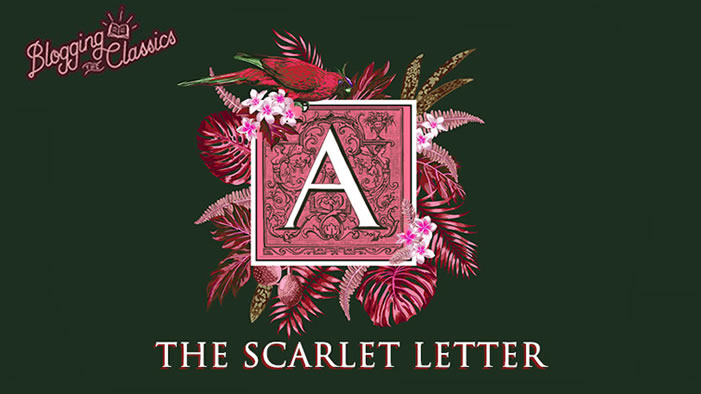Blogging The Scarlet Letter: Part 1 (Introduction)

In preparation for this series of Blogging the Classics, I went through all the SparkNotes comments on The Scarlet Letter:
- “This is the most stupid book ever. Why read a book you can’t understand? #thisbooksucks #hasnoswag”
- “I have really bad insomnia. Then my teacher assigned the Scarlet Letter. And then I had difficulty staying awake.”
- “ugh literature books these days!”
This is fair. In all likelihood you did not choose to read this book. There it was on your syllabus, slapped between the more palatable Of Mice and Men and Jane Eyre, the literary equivalent of finding walnuts in a perfectly good brownie. Hawthorne gets his bad rap from being incomprehensible. I get it. I mean, once I counted seven commas in one of his sentences and there’s really no excuse for that kind of syntactical catastrophe.
But the long and short of it is that you can’t just watch Easy A and expect to ace your English quiz. I appreciate a romcom that confronts the pervasive double standard of slut-shaming as much as the next person, but my main takeaway from that movie was the chorus of “Pocket Full of Sunshine” and nothing more.
If you’re reading this, chances are you’re either looking for something to make the Scarlet Letter journey a lot easier, or you’re my mom. Either way, there is strength in numbers, so dip the chip on your shoulders in medium-hot salsa and trust that we will get through this tome together. Because “literature books” do not have to be “ugh” “these days.”
Allow me to begin by hooking you with a description of Hester Prynne as “the embodiment of deep contradictions: bad and beautiful, holy and sinful, conventional and radical.” In other words, Lana Del Rey minus the flower crowns. ALSO: Hester is something of a proto-feminist heroine in a deeply patriarchal Puritan society, and Hawthorne wrote about her SEVENTY years before women could even vote.
If that doesn’t make you feel better about reading this, here’s a list of things to look forward to:
- Potatoes
- Love triangles
- Scaffolds
- Revenge plots
- A cute baby
- Ghosts
- The growth and sustainability of small business
Just covering my bases. Alright, from the top:
Introduction: The Custom House
Unfortunately, the adultery we were all promised is not in this chapter. This is probably because the country was one nation under God in 1850 and Nathaniel didn’t want to poke a beehive by opening his novel with a saucy violation of the tenth commandment.
We are launched directly into a 43-page introduction by a nameless ex-employee of a United States customs port. I will henceforth refer to him as “Nathaniel 2.0,” because I googled it and it turns out this intro is semi-autobiographical. Nathaniel 2.0 gains our trust by declaring that he hates a lot of things, most of all government bureaucracy. Classic!
Actually, the first thing we learn is that even though he hates talking about himself, this is the second time in his life that he’s had no other choice but to write an autobiography. To clarify, we’re on Nathaniel 2.0’s second autobiography. He has a lot of opinions, starting with how frustrating it is that he keeps moving back to his hometown of Salem, Massachusetts, even though he hates it:
It would be quite as reasonable to form a sentimental attachment to a disarranged checker-board.
If you were wondering what he thinks of you moving back in with your parents after college: “Human nature will not flourish, any more than a potato, if it be planted and replanted, for too long a series of generations, in the same worn-out soil.” (If you’re a potato, I’m a potato.)
We also learn that there is a special place in Nathaniel’s heart for his ancestors, a place that he has ripped out and stabbed with a Basilisk fang one hundred times over because he comes from a long line of terrible people. The first of these people to come to America was a judge who convicted lots of women in the Salem witch trials. Nathaniels begat Nathaniels, and all the Nathaniels thereafter “inherited the persecuting spirit.”
Even though they would’ve thought he was a total loser (his words, not mine), our narrator feels personally responsible for the misdeeds of these Nathaniels and prays that whatever curse was placed upon their house is now long gone.
Nathaniel 2.0 rambles a little about Salem, which is hard to understand because he uses way too many goddamn commas. [Let me pause here to give you the only useful piece of advice I have in this fleeting mortal life: ignore most of Hawthorne’s commas and he will make 80% more sense.]
It becomes clear that most of his coworkers are old farts with “moudly jokes” who sleep on the job—the exception being his boss, the Inspector. Even though the Inspector is disturbingly shallow and lacks a moral compass, Nathaniel 2.0 has the hots for him.
[He was] certainly one of the most wonderful specimens of winter-green that you would be likely to discover in a lifetime’s search. With his florid cheek, his compact figure, smartly arrayed in a bright-buttoned blue coat, his brisk and vigorous step, and his hale and hearty aspect, altogether, he seemed—not young, indeed—but a kind of new contrivance of Mother Nature in the shape of man, whom age and infirmity had no business to touch.
🔥🔥🔥
He admits that he might’ve spent too much time talking about the Inspector, but he’s not sorry about it. In fact, he “should be glad to dwell at considerably more length.” After all this, he says the Inspector is not important to the story. Frankly I don’t believe him on this one, but okay.
The next person we’re introduced to is the Collector. I kid you not that he takes five pages to explain to us the specifics of how and why this man was “mild and kindly.”
Nathaniel 2.0: If the Collector ever killed a man, he probably killed him in a mild and kindly manner. If he were a murderer, he’d be a philanthropic murderer. He likes FLOWERS, is what I’m saying.
I’m confused by this emphasis on flowers, so I’m assuming it’s a metaphor.
Next, he says that even though he respects his intellectual equals—Ralph Waldo Emerson, Henry David Thoreau, Henry Wadsworth Longfellow—he’s sick of them because they all have the saaaame, boring Kantian opinions. Guys, did Nate just roast his real-life transcendentalist bros? In any case, this is his explanation for taking a million pages to describe the refreshingly inferior people he worked with at the Custom House.
During this time, he alleges that he stopped reading and writing because he was preoccupied with work, but it’s pretty clear that “work” refers mostly to dreaming about the time he heard the Inspector smack his lips.
Okay, so he wasn’t engaging in any ~intellectual pursuits~ at the Custom House. Next line:
“But the past was not dead.”
This line feels loaded. Is our narrator getting existential, or is that just what we said before #tbt?
Next, he tells us that he’s almost at his main point. The real meat and potatoes of the story. LAY IT ON ME.
Nathaniel 2.0: I said almost.
😒
He describes the attic of the Customs House, which is basically a room full of trash. Lucky for us, one man’s trash is another Nathaniel’s inspiration for a novel with a 43-PAGE AUTOBIOGRAPHY as an introduction.
One day, he decides to go “poking and burrowing into the heaped-up rubbish in the corner; unfolding one and another document.” Why is he poking around in a pile of garbage? Probably to get his mind off Inspector New Contrivance of Mother Nature.
What he finds up there is a yellowing envelope.
What he finds in the yellowing envelope is a small package.
What he finds in the small package is the diary of a super dead customs Surveyor named Jonathan Pine.
What he finds in this diary of Jonathan Pine is an embroidered scarlet letter A.
Nate 2.0 has a moment not unlike Harry when he gets his first wand (You do not choose the historic symbol of ideological reinforcement; the historic symbol of ideological reinforcement chooses you!).
I happened to place it on my breast. It seemed to me,—the reader may smile, but must not doubt my word,—it seemed to me, then, that I experienced a sensation not altogether physical, yet almost so, as of burning heat; and as if the letter were not of red cloth, but red-hot iron. I shuddered, and involuntarily let it fall upon the floor.
This is a little dramatic for my taste.
On page 31, our narrator finds Jonathan Pine’s writing about Hester Prynne—who she was, what happened to her, and why. Here’s what we know about her:
- Seems to be noteworthy
- Was “not decrepit” in her old age
- Spent her later years going around the country as a volunteer nurse
- Did “whatever miscellaneous good she might”
- Was known for her good advice in matters of the heart
The conclusion Nathaniel 2.0 draws from this list is that she was probably “an intruder and a nuisance.” I am not kidding.
Nonetheless, he tells us that the story he’s written about Hester is the TRUTH, the whole TRUTH, and nothing but the TRUTH, except for the dialogue and some character traits and also a few minor plot points, which are completely fabricated.
Now that Hester’s story in his possession, he has the writerly itch again. Hallelujah! But unfortunately, the Custom House wouldn’t let him “kindle any heat” at his “intellectual forge.” This is not a phallic euphemism directed towards the Inspector so much as a statement about his writer’s block. His job is soul-sucking, thankless, and he’s frankly surrounded by a bunch of idiots.
He describes being a government employee as worse than coming down with cholera. Basically, the Custom House is Shutter Island except the people trapped there are his old fart coworkers and there’s no Michelle Williams. He wants out:
To confess the truth, it was my greatest apprehension,—as it would never be a measure of policy to turn out so quiet an individual as myself, and it being hardly in the nature of a public officer to resign,—it was my chief trouble, therefore, that I was likely to grow gray and decrepit in the Surveyorship.
As it happens, Nathaniel 2.0 is Democrat when Zachary Taylor, a Whig, is elected president in 1849, which means that almost all the Dems in government jobs get fired. This is what happened to the actual Nathaniel Hawthorne and the press went bananas with the story, which is one reason The Scarlet Letter got so much publicity. Probably also because of the extramarital sex plot.
Both Nathaniels are mad about this chain of events on principle (‘I got guillotined by Uncle Sam!’), but seem mostly relieved that they don’t have to tarnish their delicate reputations by resigning.
Nathaniel 2.0 concludes his introduction with—YOU GUESSED IT—the Inspector, who we learn was thrown off a horse and pronounced dead on the scene.
And that’s pretty much how it ends. That’s it.
Thoughts:
- I’m very pleased with the human to potato comparison.
- I’m also very happy that the Introduction is over.
- What does Hawthorne have against disarranged checkerboards? I think organized chaos is kind of beautiful.
- You know how people say that when you start a book that seems kind of “meh,” read at least 50-100 pages before you give up on it? This one gets juicy after all the expos is over.
Are you ready to REALLY BEGIN?
Find the next chapter and every installment of Blogging Scarlet Letter HERE, and an index of all our Blogging the Classics titles HERE.













